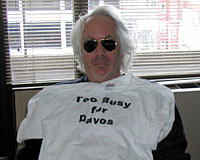 POLITICS
POLITICS In Which The Best Speeches In History Inform Our Present Moment
 Thursday, September 4, 2008 at 2:47PM
Thursday, September 4, 2008 at 2:47PM 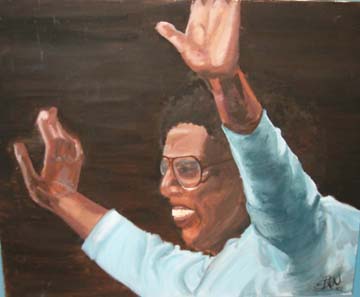
The Ten Best Political Speeches of All Time
by ALEX CARNEVALE
The art of oratory is in a strange place, as John McWhorter pointed out in a recent article in The New Republic. The shift that has taken place has been driven by technological change:
Part of the difference between our era and earlier times is technology. Speakers in the early twentieth century and before had to get their message across in large spaces without microphones. ...They were experienced by most from a distance, forced to speak precisely and use broad gestures. Today's speakers can use their natural voices, and, as often as not, their faces are shown on large screens as they speak. The old-style grandiloquence would seem affected and insincere.
The best political speeches of the last couple hundred years have been driven by a healthy mix of "old-style grandiloquence" and the everyday language that has now permeated most aspects of American life.

Never known for his oratorical skill, John McCain has made few stirring speeches in his lifetime before a national audience. It's unlikely that he will aim for any kind of transcendent moment - his campaign van is called the Straight Talk Express, and the more capable speaker Barack Obama avoided flowery language at all costs in his address in Denver. Here's our list of the top ten speeches of all time and how they can help Obama and McCain.
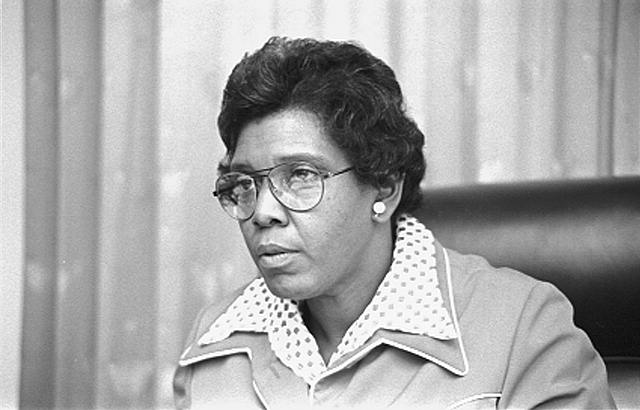
10. Barbara Jordan's Address to the 1976 Democratic National Convention (mp3)
Our favorite lesbian Democrat was born in the wrong generation. President Clinton loved the hell out of this woman and if she was younger and her health had been better, she might have been the Madeleine Albright of his administration.
Jordan's keynote was a moving, energetic address. For me, it does the best job of going past party lines to endear the audience to the speaker, while still being unabashedly partisan. If you did not like Barbara Jordan after this speech, you were crazy.
If we promise as public officials, we must deliver. If we as public officials propose, we must produce. If we say to the American people it is time for you to be sacrificial; sacrifice. If the public official says that, we (public officials) must be the first to give. We must be. And again, if we make mistakes, we must be willing to admit them.

We have to do that. What we have to do is strike a balance between the idea , the belief, that government ought to do nothing, and the idea that the government ought to do everything.

9. Ronald Reagan after the Challenger exploded (mp3)
This short address to the nation after the Challenger exploded 73 seconds after its launch is one of the great short addresses by a president to the nation. There's a reason Peggy Noonan has prime column space in the Wall Street Journal: she was one of the greatest presidential speechwriters in history. Her poignant, mannered, soulful speech for Reagan after the Challenger tragedy was a masterpiece of rhetoric. If you had to go over the top, you needed Peggy. The speech has a famous ending, but I love the structure of this part:
And I want to say something to the school children of America who were watching the live coverage of the shuttle's takeoff. I know it is hard to understand, but sometimes painful things like this happen. It's all part of the process of exploration and discovery. It's all part of taking a chance and expanding man's horizons. The future doesn't belong to the fainthearted; it belongs to the brave. The Challenger crew was pulling us into the future, and we'll continue to follow them.

As a devout Catholic, Peggy never banged on the first date, but she must had given you a hell of a time anyway. Here her faith and her love of flowery language hold up well. Masterfully done is the transition from natural language to heightened, metaphorical language. McCain should try it on for size - he's never been an inspirational figure like his counterpart (and perhaps that works in his favor with some) but a larger appeal to the nation at large wouldn't surprise me tonight.
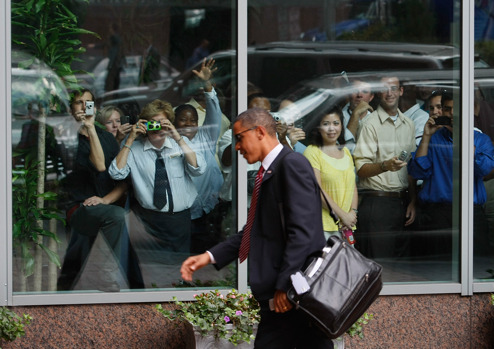
8. Barack Obama's Address to the 2004 Democratic National Convention (mp3)
if you look at the amazing focus group C-Span aired on Sunday by Republican pollster Frank Luntz, you'll see that despite the fact that Barack Obama has been a public figure since his 2004 epic speech at the Democratic National Convention, his speaking ability has never been in question. Since that fundamentally wasn't the reaction to his debut on the political scene, I think we can now agree that there's such thing as being too good of a speaker.
Both President Bushes milked this phenomenon for all it was worth, constantly pointing out that while giving speeches wasn't their strong suit, they had other strengths. Barack seems to have learned that people don't want to vote for someone they think is smarter than them.

That's why this speech was so effective. Instead of bragging about how his mother taught him to picture himself in another person's shoes, implying he's the most empathetic creature to walk the earth, Barack talked about where he came from and who he is. He needs to get back to that, stat. We don't disagree that Barack is empathetic, we just don't think swing voters care that he feels their pain. This speech had a different tone:
Hope in the face of difficulty, hope in the face of uncertainty, the audacity of hope: In the end, that is God's greatest gift to us, the bedrock of this nation, a belief in things not seen, a belief that there are better days ahead.
I think this was the moment when a lot of people made up their minds about the kind of person Barack is.
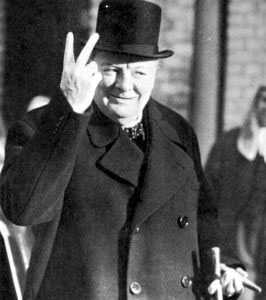
7. Winston Churchill, We shall fight them on the beaches (mp3)
When it comes to rah-rah, there was none better.
Even though large tracts of Europe and many old and famous States have fallen or may fall into the grip of the Gestapo and all the odious apparatus of Nazi rule, we shall not flag or fail.

young winston
We shall go on to the end, we shall fight in France, we shall fight on the seas and oceans, we shall fight with growing confidence and growing strength in the air, we shall defend our Island, whatever the cost may be, we shall fight on the beaches, we shall fight on the landing grounds, we shall fight in the fields and in the streets, we shall fight in the hills; we shall never surrender, and even if, which I do not for a moment believe, this Island or a large part of it were subjugated and starving, then our Empire beyond the seas, armed and guarded by the British Fleet, would carry on the struggle, until, in God's good time, the New World, with all its power and might, steps forth to the rescue and the liberation of the Old.
Winston always knew just what to say - check out his address at Harrow School. This kind of energy is more suited to John McCain. Churchill is a great model for him, even down to the level of the line.
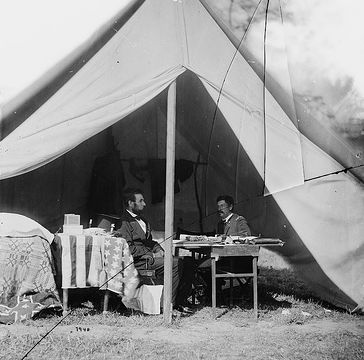
6. Lincoln's Second Inaugural Address (mp3)
This magnificent speech couldn't be given today, but it's still an amazing piece of rhetorical skill. Honestly sometimes it's like Lincoln just pumped out a really hot blog the night before and then read it as his speech and everyone was like, "YOU BLOG AWESOME LINC!" I highly recommend John Ford's Young Mr. Lincoln, it is great.
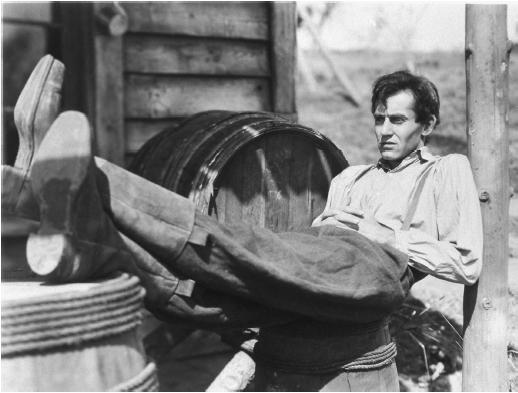
With malice toward none; with charity for all; with firmness in the right, as God gives us to see the right, let us strive on to finish the work we are in; to bind up the nation's wounds; to care for him who shall have borne the battle, and for his widow, and his orphan - to do all which may achieve and cherish a just and lasting peace, among ourselves, and with all nations.
Lincoln got stirring tributes at both conventions this year. He's a fascinating figure: depressed, sick, possibly gay. It's pretty much like if Proust had become president. I think eventually we will find a solid literary politician. In the meantime, Obama (who once considered becoming a novelist) is going to have to do.

5. Malcolm X, "The Ballot and the Bullet" (mp3)
One of the great memoirists of all time was also an extremely moving orator. Besides the obvious strengths of this speech, no one was better at knowing what to say to a specific type of person than Malcolm. It's natural that no one is too keen on comparing Barack with Malcolm. But they do share some qualities, including a way of speaking. Despite giving his DNC address on the anniversary of King's famous speech, Obama has more in common with X's oratory than King's.
The title of the speech is an echo of a Frederick Douglass essay, the kind of historical reference point that would go a long way for both candidates.
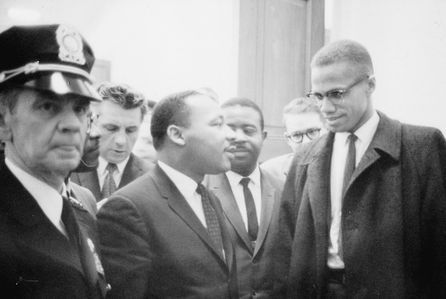
king and x
X's autobiography is on another level from most political books. It is taught in schools everywhere: the book is a moving and disturbing look at growing up in America. Like "The Ballot and the Bullet," it accomplishes that rare feat of appearing to be totally honest while manipulating the reader at the same time:
Well, I am one who doesn't believe in deluding myself. I'm not going to sit at your table and watch you eat, with nothing on my plate, and call myself a diner. Sitting at the table doesn't make you a diner, unless you eat some of what's on that plate. Being here in America doesn't make you an American. Being born here in America doesn't make you an American. Why, if birth made you American, you wouldn't need any legislation; you wouldn't need any amendments to the Constitution; you wouldn't be faced with civil-rights filibustering in Washington, D.C., right now. They don't have to pass civil-rights legislation to make a Polack an American.
No, I'm not an American. I'm one of the 22 million black people who are the victims of Americanism. One of the 22 million black people who are the victims of democracy, nothing but disguised hypocrisy.

So, I'm not standing here speaking to you as an American, or a patriot, or a flag-saluter, or a flag-waver—no, not I. I'm speaking as a victim of this American system. And I see America through the eyes of the victim. I don't see any American dream; I see an American nightmare.
This is the opposite of an appeal. An appeal can be turned down, dismissed. A proclamation must stand and be heard. I think Obama accomplished this in his speech - tonight we'll see if McCain can do the same in his.
4. Mario Cuomo, Address to the 1984 Democratic National Convention (mp3)
At a convention where the Democrats were already doomed, Mario Cuomo's task was to lay out the critique of the Reagan years that the Democratic Party still offers today.
Maybe, maybe, Mr. President, if you visited some more places; maybe if you went to Appalachia where some people still live in sheds; maybe if you went to Lackawanna where thousands of unemployed steel workers wonder why we subsidized foreign steel. Maybe - Maybe, Mr. President, if you stopped in at a shelter in Chicago and spoke to some of the homeless there; maybe, Mr. President, if you asked a woman who had been denied the help she needed to feed her children because you said you needed the money for a tax break for a millionaire or for a missile we couldn't afford to use.
Maybe - Maybe, Mr. President. But I'm afraid not. Because the truth is, ladies and gentlemen, that this is how we were warned it would be. President Reagan told us from the very beginning that he believed in a kind of social Darwinism. Survival of the fittest. "Government can't do everything," we were told, so it should settle for taking care of the strong and hope that economic ambition and charity will do the rest. Make the rich richer, and what falls from the table will be enough for the middle class and those who are trying desperately to work their way into the middle class.
Although my own views on American politics have changed dramatically since I put a picture of Cuomo and the above quote from this speech on my wall in 1994 as an 11 year old, the impact of this speech is felt constantly. While the original perfected the art of the vague anecdote, the gesture is way overdone today.

Every time I hear Obama or McCain reference a vague anecdote as a premise for policy ("I met a woman in Iowa...") I secretly blame Cuomo. Bush and Clinton did this all the time as well. It's become a political staple, but it could be easily reinvented or subverted by a clever speaker.
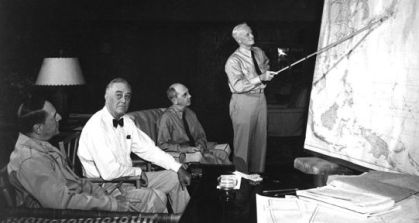
3. Franklin Delano Roosevelt, First Inaugural Address (mp3)
The entire FDR presidency reminds us of the John McCain campaign. The brilliance of political operatives is paramount in both cases. The men running the McCain campaign have solved the image problem that FDR had by using an exciting woman, while the men running the FDR campaign just used trick photography and the wink-wink of the media.
FDR is awesome to listen to on the radio. He had the perfect voice for headphones, and his voice makes thoughts simple or complicated accessible to the audience. If you've visited the quote-heavy FDR Memorial in Washington, you know he had some of the classic lines in American history.
Recognition of that falsity of material wealth as the standard of success goes hand in hand with the abandonment of the false belief that public office and high political position are to be valued only by the standards of pride of place and personal profit; and there must be an end to a conduct in banking and in business which too often has given to a sacred trust the likeness of callous and selfish wrongdoing. Small wonder that confidence languishes, for it thrives only on honesty, on honor, on the sacredness of obligations, on faithful protection, and on unselfish performance; without them it cannot live.
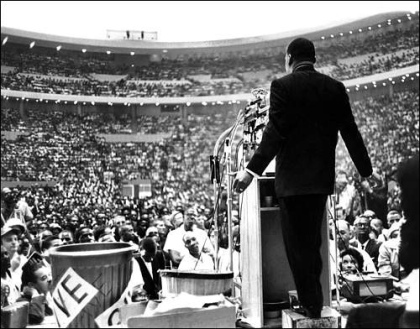
2. Reverend King at the March on Washington (mp3)
I am not unmindful that some of you have come here out of great trials and tribulations. Some of you have come fresh from narrow jail cells. And some of you have come from areas where your quest - quest for freedom left you battered by the storms of persecution and staggered by the winds of police brutality. You have been the veterans of creative suffering. Continue to work with the faith that unearned suffering is redemptive. Go back to Mississippi, go back to Alabama, go back to South Carolina, go back to Georgia, go back to Louisiana, go back to the slums and ghettos of our northern cities, knowing that somehow this situation can and will be changed.
What more can be said about this one? The only Reverend on this list, King's writings are compulsively readable, and the language never seems dated, probably because it channels religious verse rather than in spite of it. It will be fascinating to see if McCain references Christ or God in his speech. No one ever lost an election pandering to Christians.

1. Ronald Reagan's Speech at Point du Hoc (mp3)
John McCain's military career has been constantly highlighted during this convention, and Fred Thompson's long recounting of McCain's time as a POW was featured prominently on Tuesday night. Reagan wasn't much of a combat man himself (and neither was Noonan, the speech's principal writer).

reagan and daughter in the oval office
But instead of apologizing for that, he used it. He spoke from the position of most of us: the ones who owe a debt to those who served in wars. It was this refinement of where he was speaking from that made this speech so perfect:
Forty summers have passed since the battle that you fought here. You were young the day you took these cliffs; some of you were hardly more than boys, with the deepest joys of life before you. Yet, you risked everything here. Why? Why did you do it? What impelled you to put aside the instinct for self-preservation and risk your lives to take these cliffs? What inspired all the men of the armies that met here? We look at you, and somehow we know the answer. It was faith and belief; it was loyalty and love.
The men of Normandy had faith that what they were doing was right, faith that they fought for all humanity, faith that a just God would grant them mercy on this beachhead or on the next. It was the deep knowledge - and pray God we have not lost it - that there is a profound, moral difference between the use of force for liberation and the use of force for conquest. You were here to liberate, not to conquer, and so you and those others did not doubt your cause. And you were right not to doubt.
Reagan's unshakeability and moral certainty was a constant part of his appeal. When it comes to talking about our ongoing military scenarios in Iraq and Afghanistan, McCain will channel the moral certainty of his hero tonight. You can bet on that.
Alex Carnevale is the editor of This Recording. Please tell me which speeches I missed in the comments plz.

peggy and her hero
SONGS OF TRIUMPH AND DESPAIR
"Kelly Watch the Stars (live on the BBC)" - Air (mp3)
"Window" - Guster (mp3)
"Miles Away" - Madonna (mp3)

jimmy carter and daughter amy
"The French Open" - Foals (mp3)
"Sad Robot" - Stars (mp3)
"The Youth (MMMatthias remix)" - MGMT (mp3)

gerald ford and daughter
"The Spirit of Giving" - The New Pornographers (mp3)
"Genesis (Chewy Chocolate Cookies remix)" - Justice (mp3)
"As the City Burned, We Trembled For We Saw the Makings of Its Undoings in Our Own..." - The Ascent of Everest (mp3)

PREVIOUSLY ON THIS RECORDING
Michelle Obama, we hardly knew ye.
Dave Eggers really did it this time.
We made The L Word our betch.
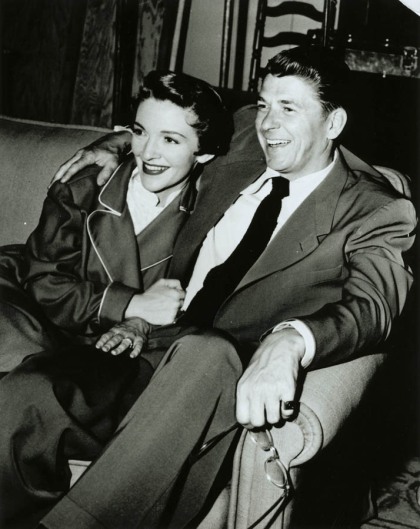
reagan and nancy
 alex carnevale,
alex carnevale,  politics
politics 































